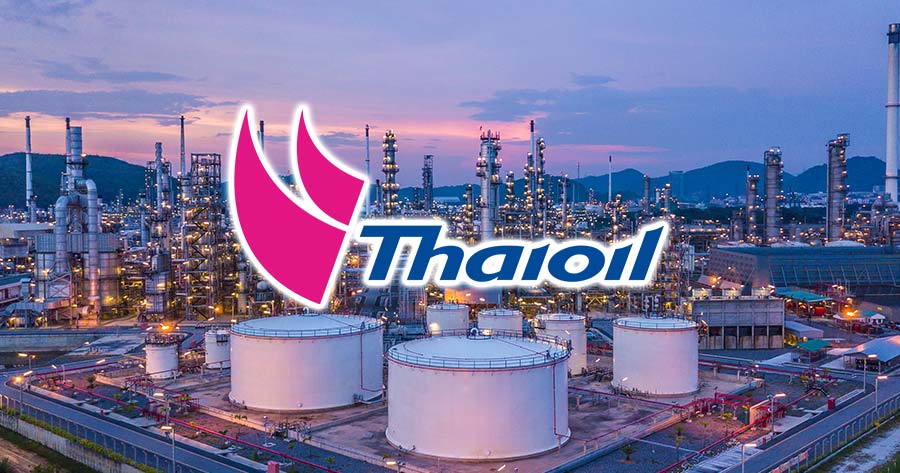The share price of Thai Oil Public Company Limited (SET: TOP) dropped 4.5% to THB26.75 per share in the afternoon trading on January 3, 2025. This could be attributable to the latest downgrade from Fitch Ratings, revising its outlook on Thai Oil to ‘Negative’, while affirming ‘A+(tha)’ rating.
The downgrade came at the time when investors were still assessing the potential impact from the delayed Clean Fuel Project (CFP) and the decision of the Boards to propose an additional injection of 63 billion baht to finish the project that was left by the main contractor, UJV.
Key details of Fitch Ratings’ review are as follows:
Fitch Ratings (Thailand) has revised the Outlook on Thai Oil Public Company Limited’s National Long-Term Rating to Negative from Stable. The agency has affirmed Thai Oil’s National Long-Term Rating and senior unsecured rating at ‘A+(tha)’, and National Short-Term Rating at ‘F1(tha)’.
The Negative Outlook reflects the risks associated with the delays to the company’s refinery upgrade and expansion project, Clean Fuel Project (CFP). These risks include delays in the cash flow from the project and additional capex required to complete it. This could sustain Thai Oil’s financial-leverage ratio above 4.5x, the level at which Fitch may take negative rating action.
However, Fitch believes Thai Oil is committed to maintaining a strong credit profile and will implement measures to control leverage. The company has set a long-term leverage target of below 4.0x, which it plans to achieve through EBITDA growth, sales of non-core assets, extending crude purchasing terms, and issuing hybrid securities. In addition, Fitch thinks the company’s plans to resolve the delays faced by the CFP and continue the project mean cost overruns and the construction timeline could differ from the company’s initial estimates.
Credit Terms Support Flexibility: Fitch believes the extended credit terms on Thai Oil’s crude purchases from its largest shareholder, PTT Public Company Limited (BBB+/AAA(tha)/Stable), will provide financial flexibility and liquidity support for Thai Oil to manage leverage during its high-investment period. Fitch expects Thai Oil to maintain the terms at about 90 days in 2025-2027 before gradually reducing to 30 days from 2028 after the CFP starts its full commercial operations.
Linkage with Parent: Thai Oil’s National Long-Term Rating incorporates a two-notch uplift from its Standalone Credit Profile (SCP) of ‘a-(tha)’, reflecting our view that PTT has ‘Medium’ strategic and operational incentives to support Thai Oil under our Parent and Subsidiary Linkage Rating Criteria. This is underpinned by our belief the petrochemical and refinery business, of which Thai Oil is a major component, is strategically important to PTT. The legal support incentives are assessed as ‘Weak’.
Importance to Parent: Thai Oil, as PTT’s largest refinery, is the parent’s main vehicle in the refinery business. Thai Oil supplies about a third of its refined products to PTT’s oil retail subsidiary, PTT Oil and Retail Business Public Company Limited. PTT also extended the credit terms for crude supply to Thai Oil to ease the subsidiary’s cash flow pressure and bought the company’s shares in Global Power Synergy Public Company Limited (BBB-/A+(tha)/Negative) to support Thai Oil’s acquisitions.
S&P and Moody’s maintain Thai Oil’s investment grade
Earlier, S&P and Moody’s also revised Thai Oil’s outlook to negative, but maintained investment grade.
S&P Global Ratings announced that it has maintained the credit rating of Thai Oil at BBB. This rating demonstrates the company’s financial strength at an investment-grade level.
However, S&P has revised its credit watch to a negative outlook due to delays and increased expenses in the Clean Fuel Project (CFP).
Meanwhile, on December 23, 2024, Moody’s Investors Service also maintained the company’s credit rating at Baa3, which is an investment-grade level as well. Moody’s believes that the company has strong financial liquidity and has carefully planned financial measures.
However, Moody’s has also shifted its stance to a negative outlook due to the delays and increased expenses of the CFP.





